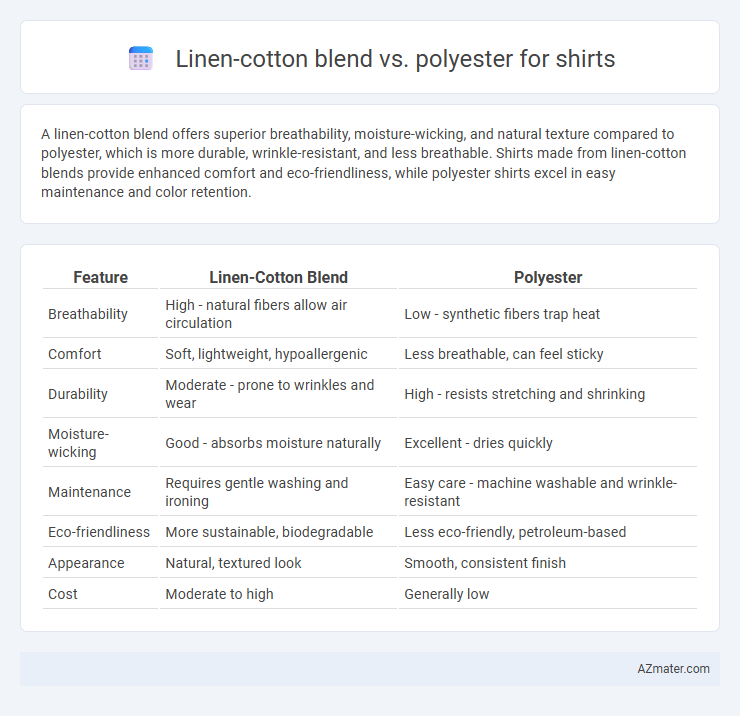A linen-cotton blend offers superior breathability, moisture-wicking, and natural texture compared to polyester, which is more durable, wrinkle-resistant, and less breathable. Shirts made from linen-cotton blends provide enhanced comfort and eco-friendliness, while polyester shirts excel in easy maintenance and color retention.
Table of Comparison
| Feature | Linen-Cotton Blend | Polyester |
|---|---|---|
| Breathability | High - natural fibers allow air circulation | Low - synthetic fibers trap heat |
| Comfort | Soft, lightweight, hypoallergenic | Less breathable, can feel sticky |
| Durability | Moderate - prone to wrinkles and wear | High - resists stretching and shrinking |
| Moisture-wicking | Good - absorbs moisture naturally | Excellent - dries quickly |
| Maintenance | Requires gentle washing and ironing | Easy care - machine washable and wrinkle-resistant |
| Eco-friendliness | More sustainable, biodegradable | Less eco-friendly, petroleum-based |
| Appearance | Natural, textured look | Smooth, consistent finish |
| Cost | Moderate to high | Generally low |
Introduction to Shirt Fabric Choices
Linen-cotton blend shirts offer breathability, moisture-wicking properties, and a natural texture that enhances comfort in warm weather, making them ideal for casual and semi-formal wear. Polyester shirts provide durability, wrinkle-resistance, and quick-drying performance, preferred for athletic and travel clothing due to their low-maintenance qualities. Choosing between linen-cotton blends and polyester depends on desired comfort, appearance, and functional performance in varying environmental conditions.
What is Linen-Cotton Blend?
Linen-cotton blend fabric combines the natural fibers of flax (linen) and cotton, offering a lightweight, breathable, and durable material ideal for shirts. This blend retains linen's moisture-wicking and cooling properties while benefiting from cotton's softness and wrinkle resistance. Compared to polyester, linen-cotton provides superior comfort and breathability, making it more suitable for warm weather and sensitive skin.
What is Polyester Fabric?
Polyester fabric is a synthetic material made from petroleum-based polymers, known for its durability, wrinkle resistance, and moisture-wicking properties. Unlike linen-cotton blends, polyester offers superior color retention and quick drying, making it ideal for activewear and everyday shirts that require low maintenance. This fabric's ability to resist shrinking and stretching ensures long-lasting shape and fit, distinguishing it from natural fiber blends.
Comfort and Breathability Comparison
Linen-cotton blend shirts offer superior comfort and breathability due to natural fibers that wick moisture and allow air circulation, making them ideal for warm weather. Polyester shirts, while durable and wrinkle-resistant, trap heat and moisture, often resulting in less breathability and potential discomfort during extended wear. The natural properties of linen-cotton blends provide a cooler, softer feel compared to the synthetic texture and reduced ventilation of polyester fabrics.
Durability and Longevity
Linen-cotton blend shirts offer natural breathability and softness, combined with moderate durability from the cotton fibers, making them ideal for lightweight, comfortable wear that withstands regular washing but may develop wear over time. Polyester shirts excel in durability and longevity due to their synthetic fibers, resisting shrinking, stretching, and wrinkles while maintaining shape and color after extensive use. Choosing between these fabrics depends on prioritizing natural comfort and breathability or extended lifespan and resistance to wear and tear.
Moisture Wicking and Sweat Management
Linen-cotton blend shirts offer superior moisture-wicking and sweat management due to the natural breathability and absorbency of both fibers, allowing sweat to evaporate quickly and keeping the wearer cool and dry. Polyester, a synthetic fabric, excels in moisture-wicking by drawing sweat away from the skin to the fabric's surface for faster evaporation but can trap odors and feel less breathable in high heat. Choosing between linen-cotton blends and polyester depends on the desired balance of natural comfort and technical moisture control, with linen-cotton providing a softer feel and polyester offering enhanced durability and quick-dry properties.
Maintenance and Care Requirements
Linen-cotton blend shirts require gentle washing in cold water and air drying to maintain fabric integrity and prevent shrinkage, while polyester shirts offer low-maintenance care with machine washability and quick-drying properties. Linen-cotton blends are prone to wrinkles and may need ironing, whereas polyester resists wrinkles, reducing the need for frequent pressing. Careful handling of linen-cotton blends extends garment lifespan, but polyester's durability and stain resistance make it ideal for busy lifestyles seeking easy upkeep.
Eco-Friendliness and Sustainability
Linen-cotton blend shirts offer superior eco-friendliness and sustainability compared to polyester due to their natural, biodegradable fibers that require less energy and water to produce. The cultivation of flax and cotton supports renewable agriculture, reducing carbon footprints and promoting soil health. Polyester, being synthetic and petroleum-based, contributes to microplastic pollution and relies heavily on non-renewable resources, making it less sustainable overall.
Price and Value Considerations
Linen-cotton blend shirts typically cost more upfront due to the natural fibers and breathable comfort, offering better moisture-wicking and durability compared to synthetic options. Polyester shirts are generally more affordable and resistant to wrinkles and stains, making them cost-effective for frequent use or budget-conscious buyers. Evaluating value involves balancing initial price with long-term wearability and comfort, where linen-cotton blends provide premium feel while polyester maximizes affordability and easy maintenance.
Best Use Cases: Linen-Cotton Blend vs Polyester Shirts
Linen-cotton blend shirts excel in breathability and moisture-wicking, making them ideal for warm weather and casual, breathable comfort. Polyester shirts offer superior durability, wrinkle resistance, and color retention, best suited for activewear, uniforms, and business settings requiring easy maintenance. Choosing between these fabrics depends on prioritizing natural fiber comfort or synthetic performance and longevity.

Infographic: Linen-cotton blend vs Polyester for Shirt
 azmater.com
azmater.com